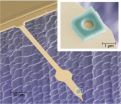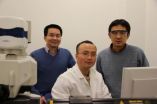(Press-News.org) A new study from North Carolina State University highlights a major flaw in attempting to use a single survey question to assess public opinion on science issues. Researchers found that people who say that risks posed by new science fields outweigh benefits often actually perceive more benefits than risks when asked more detailed questions.
"We set out to determine whether we can accurately assess public opinion on complex science issues with one question, or if we need to break the issue down into questions on each of the issue's constituent parts," says Dr. Andrew Binder, an assistant professor of communication at NC State and lead author of the study. "We found that, to varying degrees, accuracy really depends on breaking it down into multiple questions for people."
To assess the problematic nature of a single-question surveys, the researchers developed two surveys; one focused on nanotechnology and the other on biofuels. In each survey, respondents were asked an overarching question: do the risks associated with nanotechnology/biofuels outweigh the benefits; do the benefits outweigh the risks; or are the risks and benefits approximately the same? The researchers then asked survey participants a series of questions about specific risks and benefits associated with nanotechnology or biofuels.
The researchers then compared a participant's response to the overarching question with his or her responses to the specific questions in order to see whether the overarching question accurately captured the opinion of the individual respondent.
They found a problem.
"There was a significant discrepancy among people who responded to the overarching question that the risks of emerging science outweighed the benefits when compared to their responses to the questions about the specific risks and benefits," says Binder. "Namely, those same people really perceived more benefits than risks when given the opportunity to evaluate these attributes separately.
"For example, in the nanotechnology survey, 50 percent of respondents who said risks outweighed benefits actually evaluated nanotechnology positively in the other portion of the survey," Binder says. "In fact, only 35.4 percent of respondents who thought risks outweighed benefits actually calculated more risks than benefits in the specific section of the survey." The researchers found similar, though less pronounced, results in the biofuels survey.
The study also showed that people who said that benefits outweighed risks in response to the overarching question consistently perceived more benefits than risks in the specific question section of the surveys.
"The bottom line is that social scientists and journalists need to be very careful when relying on data from a single, overarching survey question," Binder says. "These oversimplified questions can result in misleading poll data and create problems for policymakers who base their decisions on those findings. They can also be problematic because they may contribute to different polls showing widely different results, which weakens the public's faith in surveys generally."
INFORMATION:
The paper, "Measuring risk/benefit perceptions of emerging technologies and their potential impact on communication of public opinion toward science," was published online Jan. 12 by Public Understanding of Science. The paper was co-authored by Michael Cacciatore, a University of Wisconsin Ph.D. student; Drs. Dietram Scheufele and Bret Shaw, professors at the University of Wisconsin; and Dr. Elizabeth Corley, a professor at Arizona State University. The research was funded by the National Science Foundation and the U.S. Department of Agriculture.
Study highlights flaw in common approach of public opinion surveys about science
2011-01-14
ELSE PRESS RELEASES FROM THIS DATE:
UT professor helps develop DinEX scale to measure restaurant appeal
2011-01-14
What is it that makes you want to return to a restaurant again and again?
The food? The service? Atmosphere?
Sure.
But according to research spearheaded by John Antun, associate professor in the Department of Retail, Hospitality and Tourism and director of the Culinary Institute at the University of Tennessee, Knoxville, and Robert E. Frash Jr., chair of the HRT department at the College of Charleston (S.C.), there are two more factors that must be added to mix: the social experience and the availability of healthy menu options.
Antun and Frash Jr. collaborated ...
Researchers find rising levels of hypertension in older Mexican-Americans
2011-01-14
GALVESTON, Texas — A new study by researchers at the University of Texas Medical Branch at Galveston reveals that the prevalence of hypertension in older Mexican-Americans living in the Southwest region of the United States has increased slightly in the last decade.
Researchers suspect the rise is due, in part, to the increase in diabetes and obesity.
Although hypertension, or high blood pressure, is one of the most common diseases in the United States, affecting more than 72 million Americans, it is one of the most manageable risk factors for cardiovascular disease. ...
U of I physicists observe exotic state in an unconventional superconductor
2011-01-14
CHAMPAIGN, Ill. - A new fractional vortex state observed in an unconventional superconductor may offer the first glimpse of an exotic state of matter predicted theoretically for more than 30 years. In a paper published in the January 14 issue of Science, University of Illinois physicists, led by Raffi Budakian, describe their observations of a new fractional vortex state in strontium ruthenium oxide (SRO). Such states may provide the basis for a novel form of quantum computing in which quantum information is encoded in the topological properties of a physical system.
"We've ...
MU scientists find new farming method to reduce greenhouse gases, increase farm yields
2011-01-14
COLUMBIA, Mo. – U.S. agricultural practices create 58 percent of nitrous oxide in the world, which is the third most prevalent greenhouse gas in the atmosphere. Scientists believe nitrous oxide contributes to global warming about 300 times more than carbon dioxide. New practices and products have been introduced to address this issue, but farmers do not have the time or profit margins to experiment with ideas that may ultimately hurt the "bottom line." Now, researchers at the University of Missouri have found methods to help farmers reduce those emissions while also increasing ...
New tool for cell research may help unravel secrets of disease
2011-01-14
AMES, Iowa – Advancements in understanding rotational motion in living cells may help researchers shed light on the causes of deadly diseases, such as Alzheimer's, according to Ning Fang, an associate scientist at the U.S. Department of Energy's Ames Laboratory and faculty member at Iowa State University.
In an article entitled "Resolving Rotational Motions of Nano-objects in Engineered Environments and Live Cells with Gold Nanorods and Differential Interference Contrast Microscopy" published in the November 2 issue of the Journal of the American Chemical Society, ...
New software quantifies leaf venation networks, enables plant biology advances
2011-01-14
Plant biologists are facing pressure to quantify the response of plants to changing environments and to breed plants that can respond to such changes. One method of monitoring the response of plants to different environments is by studying their vein network patterns. These networks impact whole plant photosynthesis and the mechanical properties of leaves, and vary between species that have evolved or have been bred under different environmental conditions.
To help address the challenge of how to quickly examine a large quantity of leaves, researchers at the Georgia Institute ...
What is life? New answers to an age-old question in astrobiology
2011-01-14
New Rochelle, NY, January 13, 2011–Biologists have been unable to agree on a definition of the complex phenomenon known as "life." In a special collection of essays in Astrobiology, a peer-reviewed journal from Mary Ann Liebert, Inc., leaders in the fields of philosophy, science, and molecular evolution present a variety of perspectives on defining life. Tables of content and a free sample issue are available online.
Why is a definition of life so important yet so elusive? As David Deamer, Guest Editor and Research Professor of Biomolecular Engineering, University of ...
Suicide risk greater for people living at higher elevations
2011-01-14
New Rochelle, NY, January 13, 2011—Twenty years of mortality data from counties across the United States led to the striking discovery that living at higher altitudes may be a risk factor for suicide, according to a provocative study published online ahead of print in High Altitude Medicine & Biology, a peer-reviewed journal published by Mary Ann Liebert, Inc. The article is available free online.
Barry Brenner, MD, PhD, and David Cheng, MD, University Hospitals Case Medical Center (Cleveland, OH), and coauthors Sunday Clark, MPH, ScD, University of Pittsburgh Medical ...
Women less interested than men in jobs where individual competition determines wages
2011-01-14
Men are more likely than women to seek jobs in which competition with coworkers affects pay rates, a preference that might help explain persistent pay differences between men and women, a study at the University of Chicago shows.
The study, which covered most of the nation's largest metropolitan areas, also revealed regional variation in how much women desire jobs in which competition plays a role in determining wages. In cities where local wages are generally lower, women tend to want jobs in which competition determines wages, the study showed.
"We know that women, ...
Electricity pricing policies may make or break plug-in hybrid buys
2011-01-14
WEST LAFAYETTE, Ind. - California policies aimed at reducing electricity use and curbing greenhouse gas emissions have the unintended consequence of making new plug-in hybrid vehicles uneconomical, according to a Purdue University economist.
Wally Tyner, the James and Lois Ackerman Professor of Agricultural Economics, said California's tiered electricity pricing system means Californians will pay some of the highest electricity rates in the country to recharge plug-in hybrid vehicles. States with flat electricity rates or those that vary price based on the time of use ...





